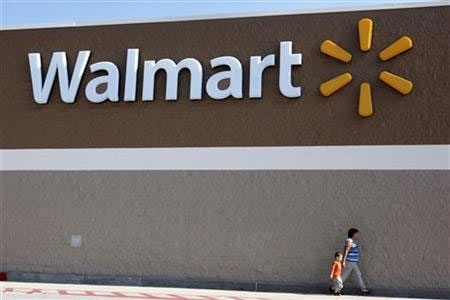By
Reuters
Reuters
Published
Jul 20, 2009
Jul 20, 2009
Wal-Mart needs industry support for green labels
By
Reuters
Reuters
Published
Jul 20, 2009
Jul 20, 2009
SAN FRANCISCO (Reuters) - In a few years, a shopper looking for a T-shirt at Wal-Mart might check its tag not only to see its size or price, but also its "green" label.
 Photo: Reuters |
Wal-Mart Stores Inc announced on Thursday 16 July plans to roll out an index that will measure the social and environmental impact of its products -- everything from the energy used to make an item to the natural resources consumed. It wants to use the index to then create eco-labels.
"There will be information to share with that consumer about how much cotton was used, how many product miles were consumed to get that T-shirt into the store, and that will make a difference in terms of what products customers consider," Chief Merchandising Officer John Fleming said at an event announcing the index, which was broadcast over the Internet.
The retailer was adamant that it did not want to develop a "Wal-Mart" index. Instead, it said it wanted to create an index that could be used by retailers as an industry standard to judge a product's sustainability.
"This is not a Wal-Mart effort," said CEO Mike Duke. "Our desire is for this to be a global standard."
The initiative is ambitious. Wal-Mart, the biggest retailer by revenue, has the cash to launch the index. But experts said it must win support from rivals for the index to gain widespread acceptance and avoid burdening vendors with competing standards that would raise their cost of business.
"If this is going to be cost effective and meaningful, (suppliers) can't have a different standard for every retailer out there," said Peter Capozucca, consumer business leader of Deloitte's Enterprise Sustainability group.
GRABBING THE NEXT GENERATION
Fleming said his vision for an eco-label may be not be seen for five to ten years.
"There are a lot of consumers that intellectually understand what we're doing, but they can't pay more or it's not enough for them to make a decision on a product," Fleming said. "But there's a generation that's coming up behind and they care deeply about this."
But creating consensus on what eco-labels should look like or measure will be a challenge.
Daniel Butler, vice president of retail operations at the National Retail Federation, said the trade group, of which Wal-Mart is not a member, has formed a consortium for retailers and vendors to share their experience in going green.
But retailers have vastly different needs and wants when it comes to selling green products.
"What might work for Wal-Mart or a Target may or may not work for a Macy's or a specialty store chain or a small independent retailer," he said.
The cost of complying with the index also looms large for manufacturers, who are being squeezed by a recession that has seen many of their customers shut their doors or slash orders.
Experts said that going green, like using less energy or smaller sized packages, can save a retailer or manufacturer money. But making green products, especially ones that use scarce resources, could produce a more expensive product.
There is also the question of what happens when there are not enough green materials to go around, said Andrew Winston, co-author of the book "Green to Gold."
"You could say you want everyone to source wood from certain kinds of sources, but there may not be enough supply of certain higher quality environmental products," he said.
Fleming said the push will result in more higher quality products at a lower cost.
But Winston said it is not yet clear how Wal-Mart or others will make the choice to stock green products if they cost more than similar ones that get a lower green rating.
"It's easy to say at the same quality and price we will choose the sustainable one," he said. "It's unclear, with all of the sustainability movement from Wal-Mart, and other big players on this field, what happens when there's trade-offs?"
(Reporting by Nicole Maestri; Editing by Gary Hill)
© Thomson Reuters 2024 All rights reserved.

























